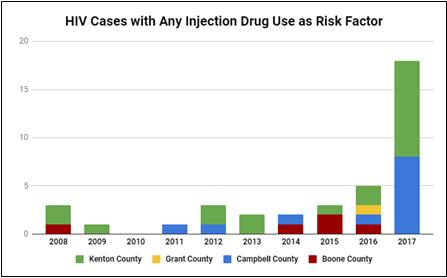Representatives from the Northern Kentucky Health Department and the Kentucky Department for Public Health announced today that they have initiated a cluster investigation of HIV infections among people who inject drugs in Northern Kentucky.
HIV case monitoring data for 2017 shows that:
• The total number of cases has increased, with 37 new cases of HIV reported to public health officials for the year, compared to 25 cases in 2016 and 34 cases in 2015.
• When asked about their risk factors for HIV infection, the number of individuals reporting IV drug use has risen significantly. In 2017, a total of 18 people reported injection drug use among their risk factors, compared to only five reports of this risk factor in 2016.
• Further analysis of the data shows that new HIV infections among individuals who inject drugs is concentrated in two Northern Kentucky counties—Campbell and Kenton.

“These numbers are concerning to us because they may be an indication of more widespread HIV infections in our community,” said Lynne M. Saddler, MD, MPH, District Director of Health for the Northern Kentucky Health Department. “Thus, we are working closely with the Kentucky Department for Public Health to investigate the situation and are recommending several measures to limit further transmission of HIV in our community.”
Communicable disease investigation
Epidemiologists and disease intervention specialists with the Northern Kentucky Health Department and the Kentucky Department for Public Health are collaborating to better understand the cases of new HIV reported in 2017. As part of the cluster investigation, health officials hope to establish whether the cases are linked to one another. Individuals who are infected will be asked to provide blood samples, which will then be genetically tested by the Centers for Disease Control and Prevention to determine if those in Northern Kentucky are infected with the same strain of HIV. Further, public health officials will attempt to interview the infected individuals to learn if there are others who are at risk for infection, to better understand the behaviors that led to HIV infection and to determine if additional response measures are needed.
“We do not want to give the impression of widespread community risk for HIV in Northern Kentucky,” said Dr. Jeffrey Howard, Acting Commissioner of the Kentucky Department for Public Health. “But we also want the public to know that the overall health of our communities depends on the health of all citizens.
“We consider this change in HIV transmission risk to be extremely important. It is equally important to emphasize that this change was discovered as part of the regular monitoring of HIV in Kentucky, which is a routine part of our work in public health. We are actively engaged in the continued surveillance and prevention of HIV/AIDS in Kentucky.”
Other steps
Health officials also recommended that actions be taken in Northern Kentucky to facilitate the identification of additional people infected with HIV and to reduce the risk of further transmission.
Public health measures that will be implemented include:
• Ensuring that people who have been diagnosed with HIV have access to appropriate care, both for infectious diseases and addictions treatment.
• Conducting targeted HIV testing among individuals who inject drugs. Testing for other infections that are common in this at-risk population as well, including hepatitis C and sexually transmitted infections, will be done.
• Encouraging other actions to reduce the risk of HIV infection, including the use of condoms and access to clean injection equipment.
• Expanding access to HIV preventative medications, such as pre-exposure prophylaxis (PrEP) and post-exposure prophylaxis (PEP).
“This is a complex investigation and the medical and social needs of the individuals are complicated,” said Stephanie Vogel, Director of Population Health for the Northern Kentucky Health Department. “But we must not forget that the individuals impacted here are members of our community. They are our friends, family members and neighbors and they deserve our support and understanding.”
Community members can support this response by:
• Promoting HIV and hepatitis C testing.
• Recognizing that individuals who appropriately manage their HIV can live long healthy lives and take steps to protect others from infection.
• Encouraging friends and family members who are using injection drugs to do so as safely as possible, and to get tested for HIV and hepatitis C. When feasible, helping to facilitate access to addiction and medical treatment. We all need to be supportive of the people in our community who are living in recovery.
• Understanding the need for access to clean injection equipment through the expansion of syringe access exchange programs.
“We know that access to clean injection equipment is a proven measure to reduce the spread of HIV and other infectious diseases among individuals who inject drugs,” said Garren Colvin, President and CEO of St. Elizabeth Healthcare. “For the last several years, St. Elizabeth and the Health Department have advocated for syringe access exchange programs in our region. Now more than ever, we need to move from advocacy to action, and encourage local officials to act quickly to allow for such programs to operate.”



















